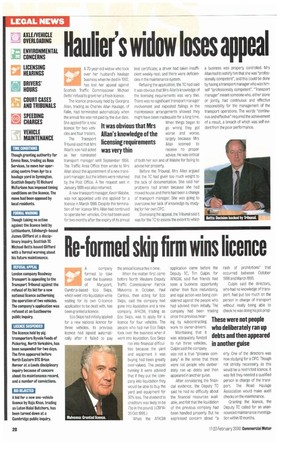Re-formed skip firm wins licence
Page 22

If you've noticed an error in this article please click here to report it so we can fix it.
company formed to take over the business of Maryport, Cumbria-based Eco Skips, which went into liquidation while waiting for its own 0-licence application to be dealt with, has been granted a licence.
Eco Skips had initially applied for a new national licence for three vehicles. Its previous licence had lapsed automatically after it failed to pay the annual licence fee in time.
When the matter first came before North Western Deputy Traffic Commissioner Patrick Mulvenna in October, Paul Carless, then acting for Eco Skips, said the company had gone into liquidation and a new company, AFKGW, trading as Eco Skips, was to apply for a licence for four vehicles. The people who had run Eco Skips took over the business when it went into liquidation. Eco Skips ran into financial difficulties because the yard and equipment it was buying had been greatly over-valued, The people running it were advised that if they put the company into liquidation they would be able to buy the yard and equipment for 30% less. The dividend to creditors was likely to be 75p in the pound. (CM1420 Oct 1999.) When the AFKGW application came before the Deputy TC, Tim Culpin, for AFKGW, said five friends had seen a business opportunity rather than face redundancy, and legal action was being considered against the people who had advised them initially. The company had been trading since the previous hearing by subcontracting work to owner-drivers.
Maintaining that it was adequately funded to run three vehicles, Culpin said the company was not a true "phoenix cornpany" in the sense that these were not people who deliberately ran up debts and then appeared in another guise.
After considering the financial evidence, the Deputy TC said he had no difficulty about the financial resources available, and felt that the liquidation of the previous company had been handled properly. But he expressed concern about "a rash of prohibitions" that occurred between October 1998 and March 1999.
Culpin said the directors, who had no knowledge of transport, had put too much on the person in charge of transport without really being able to check ne was doing his job prop erry. One of the directors was now studying for a CPC. Though not strictly necessary, as this would be a restricted licence, it was felt they needed a qualified person in charge of the transport. The Road Haulage Association would make audit checks on the maintenance.
Granting the licence, the Deputy TC called for an unannounced maintenance investigation within 12 months.








































































































